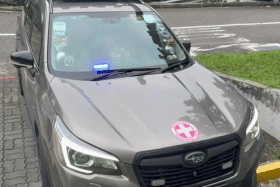Driverless buses coming to three towns soon
But question of insurance for autonomous vehicles remains unclear
In five years, driverless buses could be plying roads in three town centres - Punggol, Tengah and the Jurong Innovation District.
These buses will complement normal public buses and are aimed at providing first-last mile connections for residents and workers, announced Coordinating Minister for Infrastructure and Minister for Transport Khaw Boon Wan yesterday.
He was opening Singapore's first autonomous vehicle test centre yesterday.
Of the plan to pilot autonomous vehicles in the three towns, Mr Khaw said: "We expect that the autonomous vehicles will greatly enhance the accessibility and connectivity of our public transport system, particularly for the elderly, families with young children and the less mobile."
These towns will also be planned with autonomous vehicle-friendly features, he added.
The Ministry of Transport (MOT) and Land Transport Authority (LTA) also launched a Request for Information (RFI) yesterday to seek industry input on the key requirements for autonomous vehicles to be deployed.
While the news is exciting and reflects Singapore's investment of millions of dollars in developing autonomous vehicles, the question of insurance looms.
INSURANCE
That is because insurance companies need to know who will take responsibility for such vehicles should they be safe enough to be insured, experts told The New Paper.
Professor Subodh Mhaisalkar, the executive director of Nanyang Technological University's (NTU) Energy Research Institute, asked: "Is it the software manufacturer or the car manufacturer at fault in the case of an accident?
We might be technically ready but... the insurance companies need to be convinced we are readyMr Niels de Boer, the programme director for the Centre of Excellence for Testing and Research of Autonomous Vehicles
"Those are the issues that are far from resolved."
A self-driving car from nuTonomy crashed into a lorry during a test at one-north district in October last year. No one was hurt and nuTonomy said it was caused by an extremely rare combination of software anomalies.
In May last year, a man was killed in Florida when his Tesla car, which was on autopilot, collided with a tractor trailer.
While safety regulators later cleared the autopilot system, Tesla said it has improved its system to incorporate more safety features, such as to disable autopilot when drivers are not paying attention.
Mr Niels de Boer, the programme director for the Centre of Excellence for Testing and Research of Autonomous Vehicles, said insurers may find it hard to insure such cars in the initial stages of deployment.
He said: "We might be technically ready but... the insurance companies need to be convinced we are ready. Insurance companies are willing to insure vehicles without safety drivers if we can show that the risk and liability are within control and they can come up with the premium for it."
When asked if he thinks driverless cars will eventually be insured here, he said: "It will happen, I can see it happening."
In September last year, the General Insurance Association (GIA) of Singapore told The Straits Times that it has been engaging the LTA on the progress of autonomous vehicle tests.
It also said that the underwriting of autonomous vehicles and handling accident claims present a different set of challenges.
Singapore's first autonomous vehicle test centre opens
Singapore's first test centre for autonomous vehicles was launched yesterday just outside Nanyang Technological University (NTU).
The 2ha space, which costs $3.6 million to build, will allow the companies developing autonomous vehicle technology here to conduct tests in a safe, controlled and configurable testing environment.
Coordinating Minister for Infrastructure and Minister for Transport Khaw Boon Wan said at the opening: "We aim to develop a progressive set of scenarios that (autonomous vehicle) developers need to master before they can be safely deployed in more complex real-life environments."
The space was jointly developed by the Land Transport Authority, NTU and JTC as part of the Centre of Excellence for Testing and Research of Autonomous Vehicles.
It will be managed by NTU and will replicate road and traffic conditions and is equipped with rain and pedestrian simulators to mimic scenarios such as aggressive driving, cyclists and low-visibility, rainfall conditions.
Seven 360-degree closed-circuit television cameras across the test centre will also stream footage back to a monitoring and evaluating system.
There are at least 10 companies and institutions that are testing autonomous vehicle technology in Singapore.
- YUNITA ONG
Get The New Paper on your phone with the free TNP app. Download from the Apple App Store or Google Play Store now


